It is a Friday night in March, and Cork's Triskel Arts Centre is sold-out. A crowd of about two hundred – mostly young women – had turned up to watch a recording of the bilingual podcast How to Gael.
It was just the latest sold-out show for the podcast presented by broadcasters Doireann Ní Ghlacáin, Síomha Ní Ruairc, and Louise Cantillon, as part of a nationwide tour - which is following a sold-out North American tour.
"The reception has been overwhelmingly positive. We have sold-out a tour, which is unbelievable internationally, and here in Ireland," Ms Cantillon said, acknowledging the cultural moment the language is enjoying.
"Is dóigh liom go bhfuil rud éigin ag athrú. Tá sort tonn éigin ann agus táimid go léir ag surfáil. We’re enjoying the ride. There definitely is something happening, and it feels incredible to be part of it."
Yet, despite their own success with the podcast, Síomha Ní Ruairc says they all share a lingering frustration over the level of official support the language receives.
"Measaim go bhfuil gluaiseacht iontach shóisialta ann faoi láthair ó thaobh na Gaeilge de. Ach, cé go bhfuil sin iontach agus go bhfeicimid b'fhéidir meon ag athrú maidir leis an nGaeilge, ní féidir linn bogadh ar aghaidh gan tacaíocht cheart ón rialtas."
This sentiment is echoed by co-host Doireann Ní Ghlacáin who is also a well-known fiddle player.
"There's no doubt about it that the government really need to reform their whole attitude and plan towards the Irish language," Ms Ní Ghlacáin said.
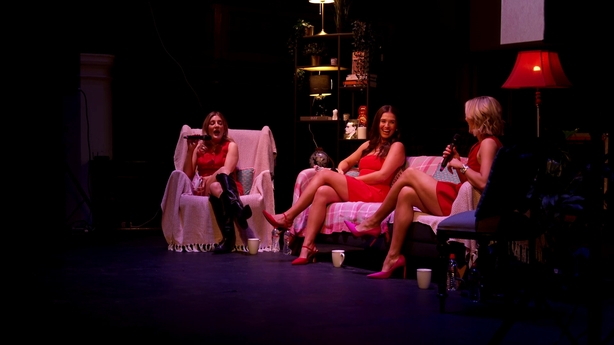
'In a weak state’
This frustration is not new. While the renewed cultural momentum around Irish is obvious — seen in everything from An Cailín Ciúin to Kneecap — questions remain about whether State policy is keeping pace.
More and more people say they can speak Irish – 1.8m, up 6%, in the latest census – but many say they struggle to find ways to do so.
Some 62% of 2,700 respondents to a survey conducted in mid-2024 on behalf of Conradh na Gaeilge, which advocates and promotes the language, said they want more opportunities to speak Irish in their daily lives.
71% said the State should give additional support to the Irish language.
Pádraig Ó Duibhir, Professor Emeritus at the Institute of Education in Dublin City University (DCU) says that without increased policy intervention, there’s a risk that this latest wave of enthusiasm could fade — as it has in the past.
"Where's the funding? Where are the schemes and where are the targets and objectives? There's lots of things in the education system and in the public service in general where I think Irish is in quite a weak state," he added.
"One of the problems is we invest a lot of money in teaching Irish and enabling students to be able to speak the language. But what they say is that they've nowhere to speak it outside of the classroom.
"Groups like Kneecap are fantastic for bringing the language to young people. But things like that come and go a little bit. We've had The Hothouse Flowers, they were very vibrant 30 years ago in terms of the language. We need lots of examples like that," Prof Ó Duibhir said.
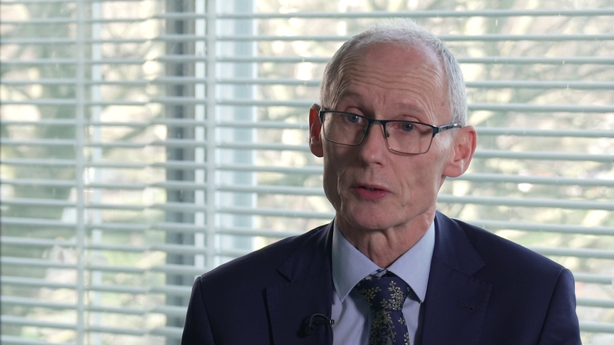
The challenge of providing spaces for people to speak the language is something Féile na bhFéidearthachtaí, an initiative of Dublin City Council (DCC), is trying to take on.
The brainchild of Daithí de Buitléir, who heads up Gaeilge 365 for DCC, the festival is a "celebration of what's possible" that showcases ideas for bringing Irish into more areas of daily life.
"When we look around and when we see examples globally of languages that have managed to turn the tide, they've tended to have three things. One is there's been grassroots movements that have built momentum, then the second pillar is national government," Mr de Buitléir said.
"But the piece we look at is local government. When we look right around the world, the role that local government plays in language renewal is to be that growth engine around usage," Mr de Buitléir added.
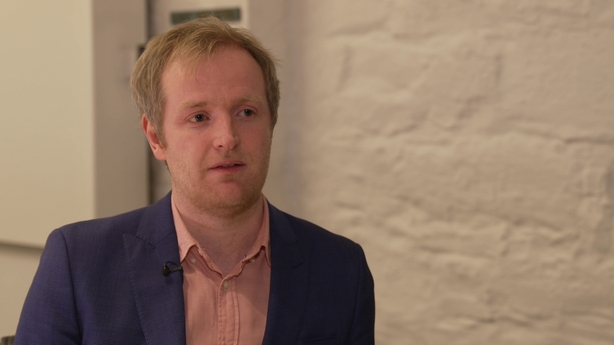
Welsh revival
Initiatives like Féile na bhFéidearthachtaí are still in early stages, but in Wales long-term investment in similar local language planning has delivered real results.
The number of Welsh speakers has rebounded in recent years, after a steady decline from 2003 to 2010. The number of Welsh-speakers has risen by one-fifth over the past 12 years, to about 800,000.
Much of that shift is attributed to the introduction of the Welsh Language Standards in 2011 by people like Ffion Gruffudd, Head of Bilingual Cardiff, an initiative of Cardiff Council.
"The Welsh Language Standards is a piece of legislation under the Welsh Language Measure which was imposed on Welsh councils. I think that's where the success in Cardiff comes from," Ms Gruffudd said.
The Standards require public bodies to provide services in Welsh, promote its use, and ensure Welsh is treated no less favorably than English.
Ms Gruffudd says the impact of these has been immeasurable, particularly in creating spaces for the language to be spoken.
"My children are in Cardiff. They can do everything in Welsh, from swimming to basketball to football, every week, from childcare to all of your sports. Everything that you could do in English, you could do in Welsh," she said.
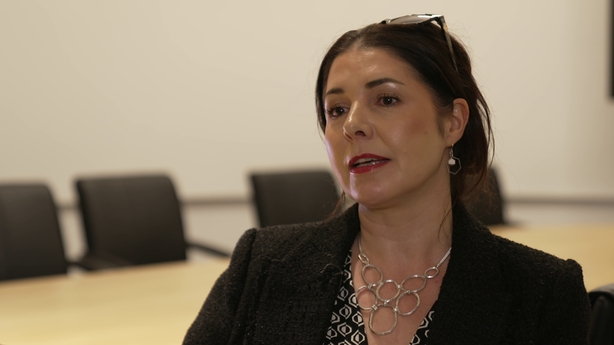
Advocates for Ireland’s Official Languages Act, which was signed into law on 21 December 2024, are hoping it will have a similar impact on this side of the Irish Sea.
Described at the time by then-Minister of State for the Gaeltacht, Thomas Byrne, as "historic" and "innovative," the Act aims to ensure that at least 20% of new public service recruits will be proficient Irish speakers by 2030.
It also similarly obliges public bodies to make use of Irish, albeit the specifics of how are yet to be published.
Yet after decades of what they feel have been false dawns about the State’s approach to Irish, the How to Gael podcast hosts are sceptical about the impact of the new Act.
"There is a problem, and it needs to be completely reformed," Síomha Ní Ruairc said.
"We've been shouting about this for years, and that's why we were tired of talking about it. People need to bring that up on the doorsteps next time the politicians call around," she added.
Experts like Prof Ó Duibhir argue that a stronger combination of funding and legislation is needed, and — while the new Languages Act is welcome — crucial policies are not being followed through with due to a lack of available funds.
"We see that from the example of Wales and the Basque country who have been very successful in reviving their languages, that legislation is key because policy tends to be high in aspiration maybe but doesn't always get to follow through."
"It's absolutely massive, the issue with the lack of funding. The funding hasn’t increased since the economic crash in 2008. The Irish language has languished and has not been funded in any way comparable to, for example, the Arts Council, which has had huge increases in funding and well deserved in that 20 years," Prof Ó Duibhir said.
The funding crisis came to a head on 26 February, when Irish language workers staged a nationwide strike.
The action was triggered by Foras na Gaeilge’s announcement of more than €800,000 in funding cuts, but some campaigners also voiced wider frustrations over the perceived long-standing neglect of the language.
Established under the Good Friday Agreement, Foras na Gaeilge is responsible for funding Irish-language groups across the island.
However, its budget has barely increased in two decades — rising from €17.2 million in 2003 to just €17.7 million in 2025, an increase of less than 2% in over 20 years, during which there was significant inflation.
Julian de Spáinn, General Secretary of Conradh na Gaeilge, said Irish-speaking communities were "sick and tired" of being treated "unequally."
"Tá an pobal gaelach tinn tuirseach don easpa cothramaíochta a bhfuil ann don Ghaeilge sa tír. Le fiche bliain anuas an méad airgead a cuirtear ar fáil don gaeilge tar éis isliú le Foras na Gaeilge agus tá sé sin ag cur isteach ar an obair gur feidir linn déanamh," Mr de Spáinn said on the day of the strike action.
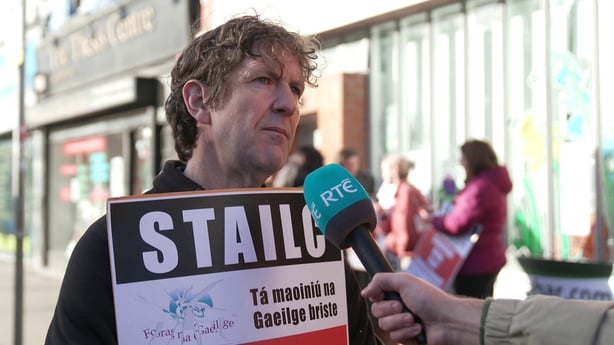
Meanwhile, some experts say the key to a widescale revival of the Irish language is not just language legislation or funding, but a revamping of the structure of the school system.
They point to the Basque Country, where a strong network of Basque-medium schools has played a pivotal role in revitalising the language, embedding it in daily life from an early age, something Prof Ó Duibhir says we did try to replicate with the Gaeilscoil movement here.
"We criticise the education system, but the success story has been the Gaelscoileanna and Gaelcholaistí where children and students are emerging from those schools with a love for Irish," Prof Ó Duibhir said.
"But since the economic crash in 2008, the number of new all-Irish schools has been tiny compared to the previous 30, 40 years from the '70s. So, we need to commit to genuine growth in that area," he added.
The number of Irish-language schools being founded annually peaked in the mid-1990s and again in the mid-2000s but has declined significantly since then in terms of actual school openings.
Eighty-two Irish-language schools opened across the island of Ireland in the 1990s — nearly twice the number that opened between 2010 and 2022 (46).
"If we want to improve the education system, that's one of the places we can start. Work with what works well, what has been successful. That has been successful," Prof Ó Duibhir said.
We need your consent to load this flourish contentWe use flourish to manage extra content that can set cookies on your device and collect data about your activity. Please review their details and accept them to load the content.Manage Preferences
The thinking is that a growth in the number of such schools would provide more people with opportunities to speak Irish consistently around the school environment, while ensuring students become fluent through immersion.
In Cardiff, Ffion Gruffudd says there are constant opportunities to speak Welsh. Some groups in Ireland are working to try to match that.
Since 2010, Na Gaeil Óga, a GAA club based in Lucan has been providing a space where Irish is not just encouraged, it’s the day-to-day reality, as parent and coach Nichola Oman told Prime Time.
"Bunaíodh an club chun spórt a imirt, ach trí mheán na Gaeilge, ag tabhairt deis do dhaoine an teanga a labhairt lasmuigh de shuíomh na scoile, go sóisialta agus go nádúrtha. Sin an sprioc atá againn," Ms Oman said.
Na Gaeil Óga is one of the fastest-growing GAA clubs in Dublin, with over 600 members and many more waiting to join. The language element is one of the biggest attractions according to Ms Oman, whose two daughters are members.
"It does encourage people to speak it more natural and to even to be thinking in Irish rather than thinking in English and then translating back into Irish. It also gives us the opportunity to promote our national language and encourage people to do so," Ms Oman said.
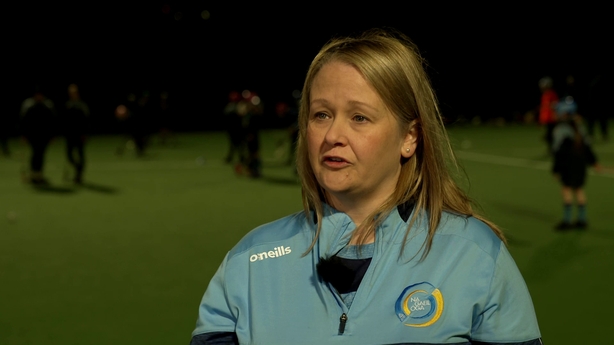
Despite doubts over the level of commitment from the State, the societal demand for Irish is real, according to Doireann Ní Ghlacáin of How to Gael.
"The generation younger than us really want to have a stake in Ireland, and feel because of economic factors - the housing crisis - it's very difficult for us to actually have equity in society at the minute," she said.
"But by buying into the culture and investing into that - and be that in our indigenous arts or our language - that's a real tangible way for us to invest in Ireland and her future."
Reporter Jack McCarron and producer Lucinda Glynn's report on the Irish language broadcasts on Prime Time on RTÉ One and on RTÉ Player on 13 March at 9.35pm.






